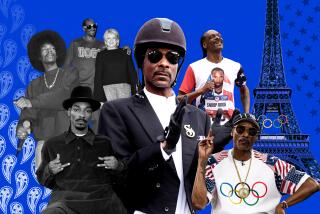Yes, It’s a Lot Better Than Big Brother : Video game manufacturers and radio stations seek to check the violence
- Share via
It has taken some prodding, but increasing numbers of entertainment companies--specifically those involved in music and video games--are discovering the virtues of self-restraint and good taste. This should be applauded as a step toward reducing the gore.
Indeed, we think it’s no coincidence that this seeming attitude adjustment comes at a time when the public’s tolerance for excessive violence is wearing thin. It’s certainly true that the lyrics of “gangsta” rappers Tupac Shakur, recently arrested for assault, and Snoop Doggy Dogg, arrested on murder charges, are not for everybody.
In addition, the proliferation of gratuitously violent video games like “Mortal Kombat” has angered many Americans concerned over what their children see and hear.
There’s an effective weapon that parents can use in fighting back: control of the family’s purse strings. And besides upset parents, companies now must worry about the possibility of government regulation, too.
In an attempt to head off threatened government intervention, video game makers led by Sega of America announced the formation Thursday of an industrywide coalition to establish a voluntary rating system for video games. Earlier this year, the Redwood City-based company introduced its own rating standards, labeling video cartridges one of three ways: suitable for a general audience (GA), for teen-agers 13 and over (MA-13), and for mature audiences 17 and over (MA-17).
Profanity, sex and violence are problems not just on the video screen but on the airwaves. Officials of Inglewood radio station KACE-FM, aware that they share in the responsibility for what young listeners hear, made a much-publicized decision last month to drop from their playlist any rap songs that feature excessive violence or misogyny. Now other stations appear to be following their lead.
KPWR-FM, the highest-rated English-language broadcast station in the Los Angeles-Orange County market, says it will delete racist and sexist epithets from rap song tracks. And New York radio station WBLS-FM has announced that it will no longer play songs that are grossly violent or degrade women or gay people.
More such efforts would come as a relief to concerned parents, most of whom clearly will welcome guidance and assistance in removing violent images from their children’s lives.
More to Read
The biggest entertainment stories
Get our big stories about Hollywood, film, television, music, arts, culture and more right in your inbox as soon as they publish.
You may occasionally receive promotional content from the Los Angeles Times.









